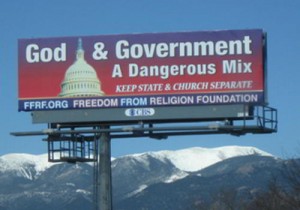Pennsylvania House of Representatives declare National Fast Day in April
Edit: This piece was originally authored April 14 and has been updated. – JV
Members of the Pennsylvania House of Representatives are at it yet again. First it was ‘The Year of the Bible,’ Prayer Month,’ ‘The Year of Religious Diversity,’ seeking to remove anonymity from individuals engaging in lawsuits seeking to uphold the separation of church and state, and now April 30 of 2013 has been declared “National Fast Day” with a passing vote of 160-35.
Pennsylvania House Resolution 17 declares April 30 of 2013 as “National Fast Day” in honor of President Lincoln’s 1863 proclamation declaring a national fast day. Lincoln’s proclamation is transcribed, in full, within HR 17.
HR 17 pushes the envolope of the Establishment Clause of the U.S. Constitution and the Pennsylvania Constitution which, respectively, prohibits governmental endorsement of religion and grants Pennsylvanians the “indefeasible right” to worship according to their own consciences.
HR 17 echoes Lincoln’s resolution which states that the senate of the United States “devoutly recogniz[es] the Supreme Authority and just Government of Almighty God” “in all the affairs of men and of nations.” A “day for National prayer and humiliation” is recognized by which “it is the duty of nations as well as of men, to own their dependence upon the overruling power of God, to confess their sins and transgressions, in humble sorrow, yet with assured hope that genuine repentance will lead to mercy and pardon.”
Lincoln’s resolution also notes that is it the duty of men and nations “to recognize the sublime truth, announced in the Holy Scriptures and proven all by history, that those nations only are blessed whose God is the Lord.” Lincoln’s resolution also suggests that the Civil War is associated with divine punishment for sins and that Americans “have been the recipients of the choicest bounties of Heaven.” America, according to Lincoln, had “forgotten God” and “have vainly imagined” that human accomplishments are solely the products of human action.
Lincoln declared April 30 of 1863 as a “day of national humiliation, fasting, and prayer” and also requested that all Americans “abstain, on that day, from their ordinary secular pursuits, and to unite, at their several places of public worship and their respective homes, in keeping the day holy to the Lord, and devoted to the humble discharge of the religious duties proper to that solemn occasion” – to hope that God will hear the prayers of Americans and forgive the sins of the nation.
While the House of Representatives do not personally affirm declarations directly taken from Lincoln’s proclamation, they recognize April 30 of 2013 as National Fast Day in light of text from Lincoln’s resolution. This mere recognition, though, should not let the House of Representatives off the hook because — through the House’s recognition — reasonable observers ought to believe that members voting in favor of HR 17 endorse Lincoln’s proclamation.
Theocrats are once again on the march in Pennsylvania diverting away from the Pennsylvania Constitution which notes that “men have a natural and indefeasible right to worship Almighty God according to the dictates of their own consciences” meaning, in part, that “no human authority can, in any case whatever, control or interfere with the rights of conscience” and that “no preference shall ever be given by law to any religious establishments or modes of worship.”
The resolution affirmed by the House of Representatives does not merely make note of so-called ceremonial deism — nominal non-specific religious statements — but is rather very specific when it recognizes Heaven, atonement for sins, communication with Almighty God, Holy Scriptures, and much more. The House of Representatives — whether by proxy or direct announcement — should not be encouraging Pennsylvanians to worship any gods nor should they be making specific statements about the nature of an alleged divine deity or recognizing specific “Holy Scriptures.” Shame on you, House of Representatives, for passing this legislation. At least 35 legislatures, perhaps because they object to this resolution, voted against it.
—
Read more thoughts on this legislation from Karla Porter, my co-host on Brave Hero Radio, within a piece titled “Dismay Over House Resolution 17 in the Commonwealth of PA” on her personal blog.
Hemant Mehta, the Friendly Atheist, also weighs in. Thanks, Hemant, for drawing attention to this issue and including analysis from Karla and I.
The Freedom From Religion Foundation weighs in and calls for action.
Americans United for Separation of Chruch and State weighs in.



Recent Comments